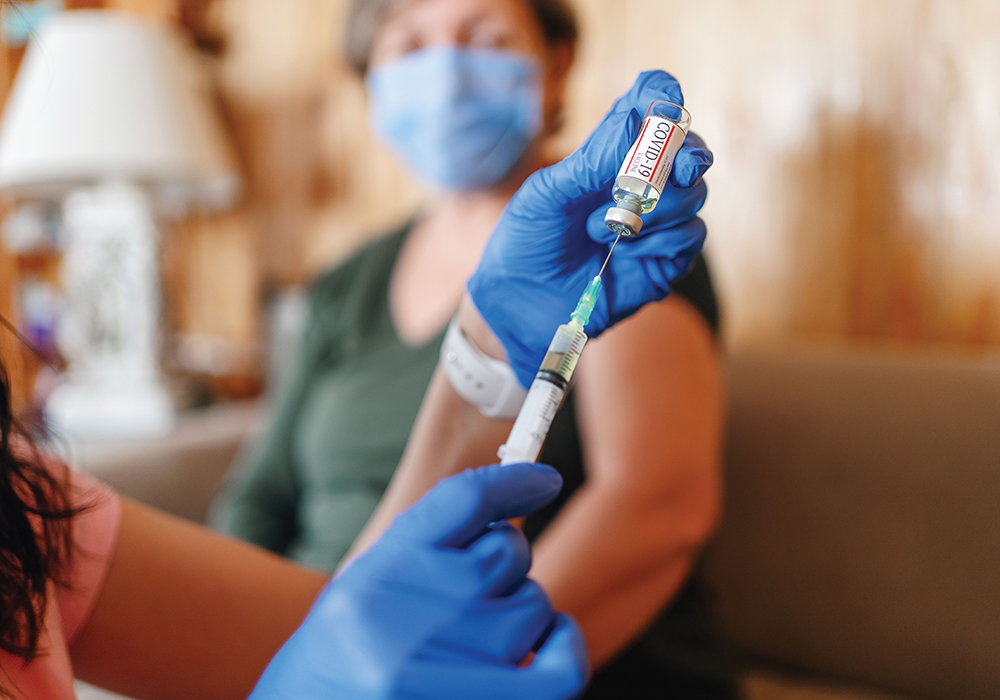People with cancer have a particular risk for infection, and vaccines can be a powerful preventive tool. According to the World Health Organization, immunization prevents 2–3 million deaths every year worldwide from diseases, including diphtheria, influenza, and measles. Here’s what patients and nurses need to know about vaccines and guidelines for people with cancer.
Vaccination Versus Immunization
Immunization is often used interchangebly with vaccination or inoculation, but the terms have different meanings. Vaccination is defined as “the act of introducing a vaccine into the body to produce protection from a specific disease,” whereas immunization is “a process by which a person becomes protected against a disease through vaccination.”
Vaccination Considerations With Cancer
Not only is infection risk increased during cancer, but certain patients are more likely to have infections that become serious or life threatening. Individuals with hematologic malignancies tend to be more immunocompromised than those with solid tumors. Other factors affecting infection risk include malnutrition, age, and other chronic illnesses.
Immunocompromised patients may not be able to mount a sufficient immune response to a vaccine dose. Clinicians must consider timing and type of vaccine administered in the context of a current cancer diagnosis. Evidence-based guidelines for immunocompromised individuals as well as patients with cancer can help guide decisions about vaccination.
ACIP Vaccination Guidelines for Immunocompromised Individuals
The Advisory Committee on Immunization Practices’ (ACIP’s) general recommendations for individuals with “altered immunocompetence” are:
- The individual’s close contacts should receive all age- and exposure-appropriate vaccines, with the exception of smallpox. Administer live MMR, varicella, and rotavirus vaccines when indicated.
- Inactivated vaccines are safe for individuals with altered immunocompetence, but live attenuated viral and live attenuated bacterial vaccines may result in severe complications.
- Avoid vaccination during or in the 14 days proceeding starting chemotherapy or radiation when possible because of the potential for a suppressed immune response.
- Hematopoietic cell transplant (HCT) recipients should be revaccinated routinely following HCT, regardless of the source of the transplanted cells. The ACIP provides specific guidence on a timing schedule for revaccination.
NCCN Vaccination Guidelines for Cancer Survivors
The National Comprehensive Cancer Network recommends the following considerations for cancer survivors specifically:
- Encourage use of inactivated vaccines in cancer survivors. Live attenuated vaccines (e.g., MMR, oral typhoid, yellow fever, rotavirus, nasal influenza vaccine) are contraindicated in actively immunosuppressed individuals, including those who have received cellular therapy with active graft-versus-host disease.
- Ideally, administer all indicated vaccines two weeks before initiation of cancer treatment.
- Administer inactivated or recombinant vaccines at least three months after completing chemotherapy.
- Live viral vaccines can be administered four or more weeks prior to treatment or three or more months after chemotherapy, but consult with an infectious disease specialist first.
- If a cancer survivor received anti–B-cell antibody therapy, delay vaccination for at least six months after the last dose.
- More studies are needed to provide evidence for vaccination recommendations following CAR T-cell therapy.
Patient Education
A Healthy People 2030 goal is to increase U.S. vaccination rates. Nurses can contribute by providing patients with clear, evidence-based education about vaccination and why it may be important for them.
Additionally, identifying, understanding, and removing barriers to vaccines are critical. Social determinants of health, structural inequities, and even political factors can influence whether a person receives a vaccine. As a trusted voice, nurses can advocate for, inform, and guide patients to making the choice that is right for them.






